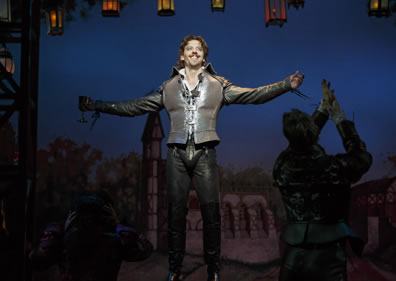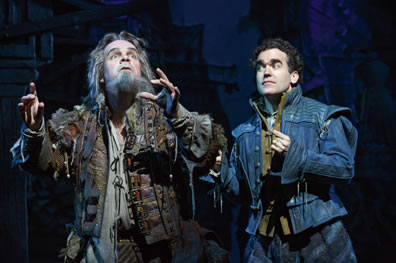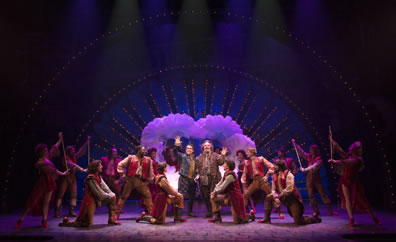Something Rotten!
So Freakin' Awesome
Book by Karey Kirkpatrick and John O'Farrell, music and lyrics by Wayne Kirkpatrick and Karey Kirkpatrick
St. James Theatre, New York, New York
Saturday, November 21, 2015, C–110&111 (center mezzanine), and Saturday, March 5, 2016, H–108&109 (center stalls)
Directed and Choreographed by Casey Nicholaw

Will Shakespeare (Christian Borle), "the Will of the people," takes in the adoration of his fans in "Will Power," one of the numbers in the Broadway musical Something Rotten!. Photo by Joan Marcus, Boneau/Bryan-Brown.
Nick Bottom—not that Nick Bottom in A Midsummer Night's Dream but the theater impresario in Elizabethan London—is readying the world's first-ever musical play when he hires an actor named Toby Belch from York, the northern England city and province. When an argument erupts between Nick and his co-writing brother Nigel over composition of Omelette The Musical, Toby sides with Nick. "I really like the new York actor," Nick says.
Don't click quit just yet. Really, this is serious matter here. This is Something Rotten!, the Tony-winning Broadway musical that indirectly ties William Shakespeare to the American musical. One part Shakespeare in Love and three parts The Producers, Something Rotten! sends up Bardolatry, musicals, and political theater with lots of great puns along the way. Even the show's title is a pun (you can pay big money to see something rotten on Broadway). Nevertheless, its writers, Karey Kirkpatrick and John O'Farrell with music and lyrics by Wayne Kirkpatrick and Karey Kirkpatrick, display such fathoms' deep appreciation for Shakespeare—his biography, his iconography, and his works—that they have created a musical about Shakespeare that is Shakespearean in its comic textures.
Take the new York actor joke. For one thing, the new York actor is really Shakespeare in disguise, a performance totally fooling Nick Bottom who claims Shakespeare is a terrible actor. Furthermore, the joke foretells New York's ultimate impact on Something Rotten!'s plot, on the production itself, and on Shakespeare, too. Taking this joke a step further—perhaps over the precipice of credibility—the notion that Shakespeare is disguised as a Yorkist tweaks the popular notion that the real Shakespeare had political constraints when writing his history plays, namely Richard III.
Its own writers may object to hearing Something Rotten! praised as rich intellectual fodder since it performs as a grab-bag of laughs and catchy tunes with clever lyrics (sample: "Don't be a penis, the man is a genius" Nick's troupe sings to him in the song "God, I Hate Shakespeare"). Yet, there, again, the lines have many points of reference. The song title is a constant refrain we Shakesgeeks hear all the time from people who have had a passing interaction with Shakespeare—usually in school; but here it's being sung by a contemporary rival to Shakespeare who hates the man himself for everything from his feigned humility to his silly collar and "all the twits who bloviate about Shakespeare." Later, though, in the reprise of "God, I Hate Shakespeare," Nick Bottom (Tony-nominated Brian d'Arcy James in a performance of great vigor) reveals that he would give his "left nad" to be Shakespeare. "He is everything I ever dreamed that I could be," Nick sings. We'll call that Bottom's Dream.
Upon entering the theater for Something Rotten!, you might be expecting a story with Shakespeare and Bardolatry as its centerpiece. But the Bard—"Why the Bard? He's a bard. We're all bards," complains Nick Bottom—is only an avenue to the real purpose of Something Rotten! as Bottom hires a soothsayer to reveal the next big trend in theater. The soothsayer, Nostradamus (Tony-nominated Brad Oscar, wonderfully mystical like a cat in contemplation), looks into the future and sees musicals. Of course, the concept of characters breaking into song seems "utterly absurd" to Bottom, though James himself has broken into song to deliver this line. This is the opening salvo to the great showstopper number "A Musical," complete with a tap-dance break, chorus line, and the revelation that some musicals have no talking at all ("That sounds miserable," Bottom says, which sets up a joke you can see coming from lower Manhattan, but it still brings the house down). If the tune itself sounds hackneyed, it's supposed to, a generic song-and-dance number containing musical references to 19 hit musicals. It's a satire on musicals that, by its very nature, proves why musicals are so entertaining.
The great gamble Messrs. Kirkpatrick and O'Farrell make with "A Musical" not only is relying on audience response to land the number's grand finale joke, but also putting their climactic show-stopping piece halfway through the production's first half. How can they match it, let alone top it, the rest of the way? Well, they have a couple more aces up their sleeves.
One ace is another show-stopping, big production number at the end. Bottom uses the bubonic plague as the topic of his first attempt at a musical ("Black Death, Black Death! Woo!" sung as if it were the wind sweepin' down the plain). Not surprisingly, the patron shuts it down before it even gets through rehearsals. So, Bottom returns to Nostradamus to find out what Shakespeare's greatest hit will be so that he can steal it before Shakespeare writes it. The soothsayer looks into the future and sees "Omelette," and something about ham and Danish. This leads to the staging of Omelette The Musical, a mash-up of as many musical and Hamlet references as can be jammed into a 10-minute number. Because Nigel (John Cariani as a sweetly poetic nerd) refuses to work with his brother on such a stupid thematic concept as breakfast—in fact, he's written lines that sound suspiciously similar to those in Hamlet—it's left to Nostradamus to write Omelette based on his visions. Thus, we get a fiddler on the roof; a singing nun; Egbert (played by Nick) saying, "Alas, poor yolk, I know thee well"; a masked phantom as the ghost of Egbert's father singing about trouble in River City; and everybody looking for Macavity—but he's not there. West Side Story makes it into the mix as a tap-dance rendition of an omelette recipe: "Crack! Splat! Pssss, make an omelette. First, melt a tablespoon of butter in a medium frying pan over medium heat and sauté the onions and green pepper 'til they're tender. Add the ham pieces." Of course, it has to be a Western omelette.
The second ace up the writers' sleeve is Shakespeare himself, specifically Christian Borle's Tony-winning portrayal of "The Will of the people" as a rock god. We catch only a glimpse of Shakespeare in Something Rotten!'s opening number, "Welcome to the Renaissance," (in which he is described as "the bomb," "the soul of the age," "the whiz of the Elizabethan stage," and "just so freakin' awesome"). Otherwise, Something Rotten! seems intent on relegating Shakespeare to mentions until well into the first half when we finally get to see Shakespeare in the park—really, he's in the park, though his show is more akin to the Rolling Stones playing a free concert in London's Hyde Park than the Public Theater's productions of Shakespeare plays in New York's Central Park. A cross of Justin Timberlake and Freddie Mercury with moves like Jagger (his codpiece seems to have a mind of its own), Shakespeare and the Four Gentlemen of Verona perform his greatest hits from sonnets and plays, getting his audience to sing along and making after-show assignations with some Elizabethan beauties. "Do you want more?" he teases the crowd. Of course they do. "When do you want it? Tomorrow? Later? Let me hear you say NOW!" This kicks off a call-and-response sequence that leads into "Now is the winter of our discontent made glorious summer by this son of York," which, in turn, becomes a takeoff on Van Morrison as Will spells out "G-L-O-R-I-O-U-S."
Borle's Will is a self-aware genius ("See what I did there?" he likes to say after showing off some poetic gymnastics) and pretty much as Nick Bottom describes him in "God, I Hate Shakespeare." Yet, we see the other side of being Shakespeare in Something Rotten!'s best number, "Hard to Be the Bard," a slickly choreographed piece (courtesy of Tony-nominated Director and Choreographer Casey Nicholaw) in which Will sings of the pressures of being famous and the greater pressures of writing hit after hit. "I know writing made me famous, but being famous is just so much more fun," he says, then sings, "What people just don't understand is that writing's demanding, it's mentally challenging, and it's a bore, it's such a chore." Writers everywhere can appreciate how he has to find the right word, pacing the floor, hoping for divine intervention, "that one little nugget, that one little spark." But it really is harder for the Bard because, when the eureka! moment comes and "Now you can write, right? Wrong! You're not even close, you remember that damn it, your play's gotta be in iambic pentameter." Makes you appreciate even more what the real Shakespeare actually accomplished, even if he was guilty of plagiarism.
Something Rotten! does not engage in revisionist history in its portrayal of Shakespeare—at least in substance (contextually, the "Will of the People" is in keeping with the tone of the whole production, emphasized by the psychedelic Elizabethan costumes designed by Gregg Barnes, another Tony nominee). A contention among anti-Stratfordians (those stirring up the authorship debate) that Shakespeare was a failed actor is taken up in Nick Bottom's opinion, and it's the one insult that gets under the skin of Borle's Will. However, should we trust the opinion of a character named after a bad actor? In fact, in the historical record, Shakespeare's acting ability was respected among his peers, and thus in Something Rotten!, general report lauds his acting and Borle's Shakespeare proves his thespian skills via his performance as the new York actor (indeed, Borle could have earned another Tony nomination for his portrayal of Toby, too). Upon his dramatic revelation at the end of Omelette, Shakespeare strides off stage pointing at someone in the audience and says, "Yes, you just saw that happen."
Thankfully, the authorship question itself is never broached in Something Rotten!, probably because no evidence exists that anybody in Shakespeare's time questioned whether he wrote the plays (it would take more than 200 years and several generations of shifting cultural mindsets before that idea could even be broached). Fictional plot aside, the writers hew closely to recorded facts. That record includes an accusation one contemporary leveled at Shakespeare that he plagiarized others' works, and Something Rotten! runs with this. Nick Bottom makes the claim, and we see Will attempting to pilfer Nigel's poetry after the concert in the park. Nigel, who is smitten with Shakespeare ("He's brilliant, what majesty flows from his pen, his poetry soars like a sweet violin"), in the end allows Will to look at the verses that Nick turned down for Omelette. Claiming that what Nigel has written are "just a lot of clichés," Will takes custody of the verses, ostensibly to provide Nigel further guidance. Of course, these verses form the basis of Hamlet. I find a wonderfully subtle subtext to the joke here. Nigel's verses culminate with "To thine own self be true," a line many people unfamiliar with Hamlet quote out of its true context; but Nigel uses the phrase in the way most people apply it, so in this transaction it will be Shakespeare who takes the line out of its original context when in Hamlet he has Polonius include it among the precepts he gives his son, Laertes.
Furthermore, the line "To thine own self be true" becomes the moral of Something Rotten!'s narrative. It is the lesson Nick Bottom must learn, but it also is a lesson we should apply to ourselves and to others: Shakespeare, for instance, a Will of the people, as in, he's one of us and not some übereducated aristocrat.

In the Broadway musical Something Rotten!, Nick Bottom (Brian d'Arcy James, right), a failing theater impresario in Elizabethan London and rival to William Shakespeare, consults the soothsayer Nostradamus (Brad Oscar) to foretell the future of theater arts. What Nostradamus sees is.…

"A Musical," the showstopper number sending up Broadway musicals while referencing 19 hit musicals. The show is directed and choreographed by Casey Nicholaw, who received Tony nominations for both his direction and choreography, as did d'Arcy James and Oscar for their performances, among the 10 nominations the show garnered. Christian Borle won the Tony for his portrayal of Shakespeare. Photos by Joan Marcus, Boneau/Bryan-Brown.
By transplanting musical theater to Elizabethan times, Something Rotten! reverse engineers our own era's perspective on Shakespeare. Part of the obstacle in interpreting and appreciating Shakespeare—and a basis of the whole who wrote Shakespeare nonsense—is our 21st century inability to fathom the mindset of the 16th century theater industry. Reverse that and consider the 16th century playwright's inability to fathom concepts that are second nature to us: a two-hour play about cats with no plot, plays in which every line is sung, plays with dance breaks that have nothing to do with the story. And why is there a fiddler on the roof? You think people talking in iambic pentameter blank verse is weird? How weird is it that everybody on the streets of London knows the lyrics to "Consider Yourself" and every guy and girl in a high school can do the choreographed dance steps for "Summer Nights"?
Something Rotten! is as much a celebration of what New York brought to the theatrical art form in the 20th century as London contributed in the 16th century. At the end, while Hamlet has just attained the peak of Elizabethan theater in London, the first seeds of the musical are being sown in America, though nothing rhymes with America. Other modern perspectives are presented through the two leading women in the play. Bea (a glorious Heidi Blickenstaff) is Nick Bottom's wife and the forbearer of women's liberation. "There's a woman on the throne," she says. "It's the '90s: women will have equal rights with men by the end of the century." Portia (Kate Reinders), the daughter of the Puritan preacher Brother Jeremiah, has a devotion for poetry in spite of her Puritan upbringing and becomes a love interest for Nigel. The running joke in the Puritan portrayals is how their repression of sexuality constantly backfires. Everything Brother Jeremiah preaches (we saw two different understudies in the part, Aaron Kaburick and David Beach) turns into sexual innuendo writ large, and sharing poetry together literally becomes an orgasmic experience for Nigel and Portia ("At night, alone in my bedroom, satisfying my need the candlelight fire ignites my desire—to read," she sings).
Though many commentators have pegged Something Rotten! as a play that sets out to take the Bard down a notch and appeal to all those people out there who, God, they hate Shakespeare, I see it as a product of some brilliantly creative guys who have a true appreciation of Shakespeare's and musical theater's contributions to our world. And by "true appreciation" I mean not just admiration of the sonnets and plays but also portraying Shakespeare as what I suspect is closer to the real thing than most Bardolators would care to admit. To borrow John Lennon's own assessment of the Beatles, Shakespeare was just a man who happened to make it very very big. A genius, to be sure, who, via his middle class upbringing, hard work, and great feel for his audience, "really [knew] how to write a bitchin' play," as Nick Bottom's troupe say.
Still, as Will himself sings, "It's really really hard, it's sexy but it's hard, this bar that I'm raising to be this amazing, it's hard." That is true, but yet he is everything I ever dreamed I could be.
Eric Minton
May 17, 2016
Comment: e-mail [email protected]
Start a discussion in the Bardroom



 Find additional Shakespeareances
Find additional Shakespeareances